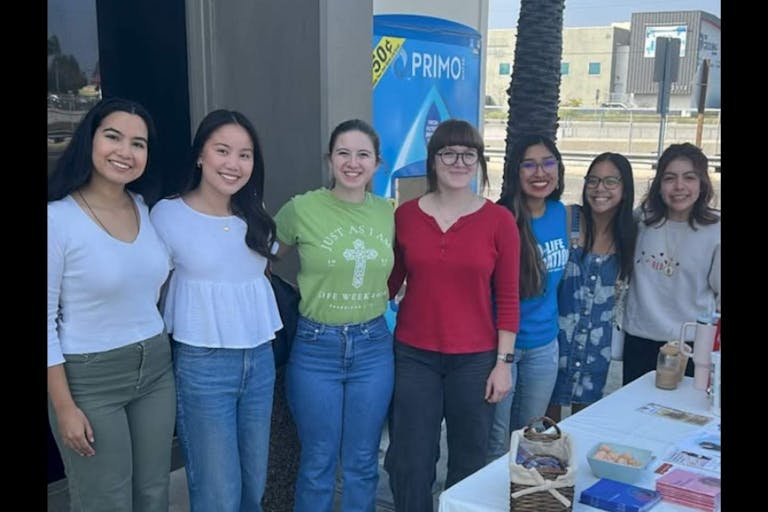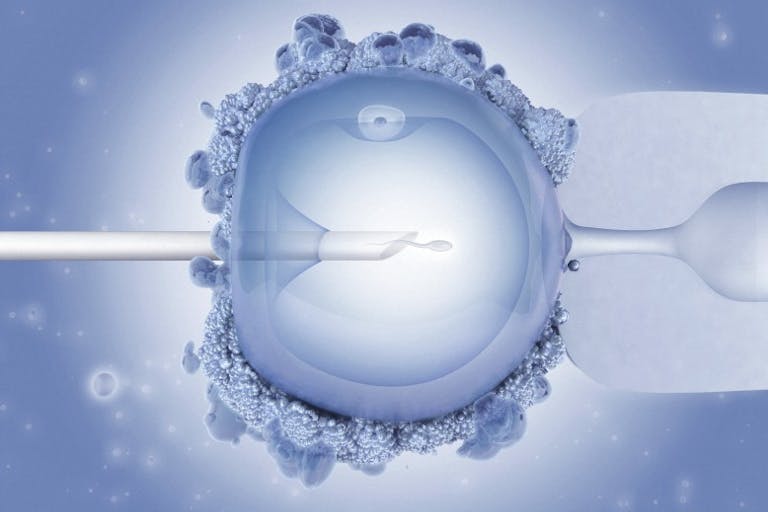
Christian college allows pro-life club after resolving 'misunderstanding'
Bridget Sielicki
·
Guest Column·By Camila Salcedo
Woman conceived via IVF: The means don’t justify the end, even if the end was me
A year ago, I stumbled upon an article in which a Chilean actor shared his regrets of using in vitro fertilization (IVF) to conceive his children. In the article, he discussed several moral problems of IVF, which motivated me to learn more about the topic. I was shocked and worried.
After all, I was conceived through IVF.
I knew my mother had decided to use IVF after a very long and tiring fight with infertility. After seriously trying to conceive for several months, my parents went to their OB-GYN and found out that my mother had a very severe case of endometriosis, a uterine tissue disorder. That was the beginning of four years of fertility treatments.
My parents, both of whom are specialized medical doctors, decided with their OB-GYN to begin with treatments aimed at my mother’s endometriosis, including several surgical procedures in which they tried to clean out her fallopian tubes. When these procedures didn’t work, they moved to hormonal treatments. When that didn’t work either, they felt they had only one option left: IVF.
READ: Reproductive specialist warns that IVF is creating infertile children
IVF is a procedure in which embryos are fertilized outside the mother’s womb. After an intense hormonal treatment, the mother’s ovules are extracted and joined with the sperm of the biological father in a petri dish in a laboratory. For three or four days (sometimes longer), the fertilized zygotes grow into morulas in the petri dish. Then, they are transferred back to the womb.
However, there are several reasons why I believe this procedure is morally wrong:
1. IVF goes against the child’s right to be conceived out of conjugal love.
It transforms the conception of a child into no more than a technical process–which means it inevitably compromises the dignity of the lives that are brought about during this process. It separates sex from its procreative end, and it separates conception from the expression of love that was intended to be its context.
2. IVF is problematic because of how it treats the zygotes.
Most IVF clinics fertilize more embryos than they plan to transfer into the mother’s womb because only a few are expected to survive in the petri dish. The embryos that survive but are not transferred into the mother’s womb are either killed, used for scientific research, or frozen for possible further use. Even when no embryos are directly killed in the process, the probability of natural deaths in IVF is significantly higher than in natural conceptions. After all, for women between the ages of 20-30, 83-91% of natural pregnancies survive the first seven weeks, while only 30-35% of transplanted embryos lead to live births (not to mention the embryos that died in the petri dish).
Article continues below
Dear Reader,
Have you ever wanted to share the miracle of human development with little ones? Live Action is proud to present the "Baby Olivia" board book, which presents the content of Live Action's "Baby Olivia" fetal development video in a fun, new format. It's perfect for helping little minds understand the complex and beautiful process of human development in the womb.
Receive our brand new Baby Olivia board book when you give a one-time gift of $30 or more (or begin a new monthly gift of $15 or more).
Thus, this process sanctions the manipulation or death of multiple lives simply to give birth to a few, or even one single life. If we recognize that life begins at conception, we realize that a great number of IVF procedures involve either multiple abortions or technical manipulations that do not respect the dignity of those already-conceived lives.
3. IVF opens the door to many other ethical problems.
Surrogate motherhood compromises the dignity of underprivileged women, whose bodies are treated as merchandisable goods, as means to satisfy the ends of the couples.
IVF opens the possibility of selection, where parents can screen the genotypes of the embryos before implantation. This means parents can choose which children will be born and which will be killed based on genotype alone, which is troubling in many ways.
IVF can be accompanied by MFR, multifetal pregnancy reduction, in which parents abort some of the implanted lives to reduce the pregnancy to the number of babies they desire. Killing the zygotes in the petri dish is different from MFR because the lives in MFR are already implanted. However, both procedures are equally immoral because both involve the killing of conceived human beings.
Many clinics offer the service of sperm or ovum donation, by which an unknown donor or vendor can give his or her sperm or ovum, which adds a third party, an external biological parent. This means that the child is both conceived out of the context of conjugal love and conceived from two parents completely unconnected to each other. Many of these donors or vendors, often anonymous (their identities are often hidden from their children), have tens, or even hundreds, of children.
My parents’ consciences were troubled because their medical knowledge indicated to them that there was something just wrong about it all –and they did not practice any religion at the time. They were initially divided about the process but decided to go through with it, thoroughly investigating the clinics nearby and choosing one they trusted the most. But in the process, they learned that another nearby clinic had been in trouble for using third-party ovules without the parents’ consent. My parents also asked the clinic to fertilize very few embryos and to transfer all of the ones that survived into my mother’s womb because they were deeply troubled by the ideas of killing, freezing or donating them. They even asked themselves if it was morally right to spend so much money on this expensive process while there is so much poverty in the world.
In the end, they decided for it. After two failed IVF attempts, my mother felt uneasy about doing a third procedure because she found the failed procedures emotionally draining. However, they decided to do a third attempt, from which I was born.
READ: Former IVF doctor: Children are viewed as ‘manufactured goods’
When I first learned of the moral wrongs of IVF, I didn’t know much about my parents’ story. I was very thankful when I learned that they hadn’t had any abortions–or any of the other morally troubling options that make IVF worse than it is on its own. However, despite the measures they took, I believe IVF is never morally permissible. As a Christian, I knew that the troubling way in which I was made did not take away my inherent dignity, and it was absolutely clear to me that God loved me the same as any other person. I also knew that God loved my parents infinitely despite having used IVF and that He wanted to forgive them and help them heal–but that could only happen if they first realized what was wrong with IVF. After a month, in which I prayed more than ever before, I decided to talk to them about it.
During that month, however, and without me raising the topic, they started talking about one of my twin brothers who died in the womb. I knew about him, that he had been conceived in the same IVF procedure. We were the only two to implant, but he had only survived in the womb for a couple of months. I didn’t know much more; he was unnamed and would rarely come up in our conversations. Yet, that month, the month in which I prayed so much about my parents’ IVF procedures, my mom dreamed, for the first time, that she was breastfeeding him.
I later learned that after losing him in the womb, she tried to forget him; she tried to dismiss the topic because she felt that if she gave much mind to it, she would have been ungrateful for the daughter who had survived. Consciously, she felt fine. Yet, for many years she kept dreaming that she had forgotten her son. It was a recurring nightmare, where she would be with me when she suddenly remembered she had forgotten him somewhere or forgotten to feed him. However, she never once saw him in her dreams until that month.
Since my parents had heard of the importance of naming unborn children who had passed away, that dream sparked their interest in thinking of names for my brother. They chose Jose, which had special meaning to me, as it was the same name of Saint José Sánchez del Río. I felt strengthened me to raise the topic of IVF for the first time with my parents, and they shared with me the whole story. It was the first of several deep and meaningful conversations we’ve had on the topic.
I am still grateful that reading another IVF story made me inquire and pray about my own. I am also grateful for how all of this made me realize the importance of raising awareness about the moral problems of IVF. Just as reading another’s story helped me, I hope my story, too, can help someone else.
I believe in moral truths, and what’s wrong doesn’t become right for me benefitting from it. The means never justify the end–even if the end was me.
Live Action News is pro-life news and commentary from a pro-life perspective.
Contact editor@liveaction.org for questions, corrections, or if you are seeking permission to reprint any Live Action News content.
Guest Articles: To submit a guest article to Live Action News, email editor@liveaction.org with an attached Word document of 800-1000 words. Please also attach any photos relevant to your submission if applicable. If your submission is accepted for publication, you will be notified within three weeks. Guest articles are not compensated (see our Open License Agreement). Thank you for your interest in Live Action News!

Bridget Sielicki
·
Guest Column
Mark Lee Dickson
·
Guest Column
Right to Life UK
·
Politics
Tyler O'Neil
·
Guest Column
Mark Lee Dickson
·
Guest Column
Mark Lee Dickson
·